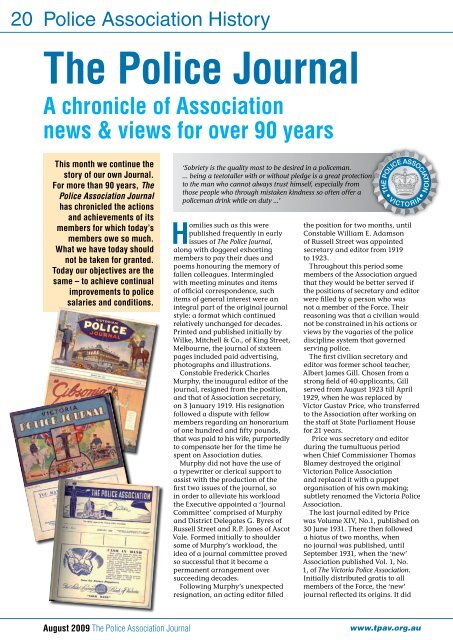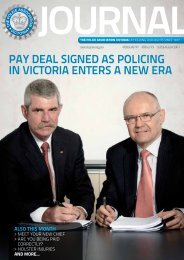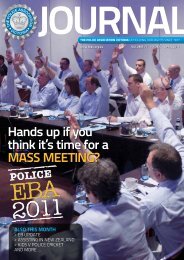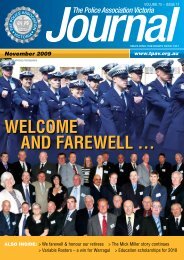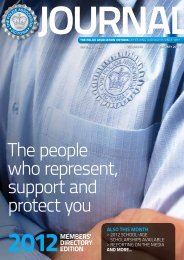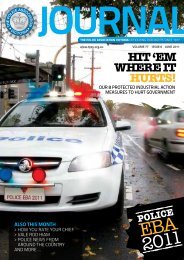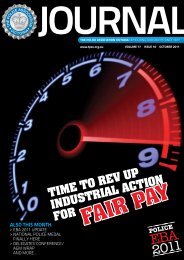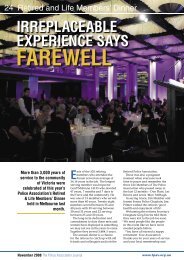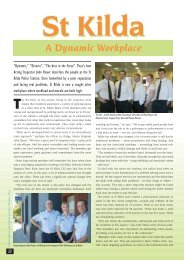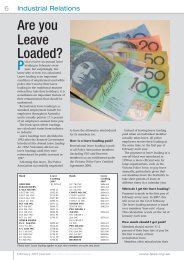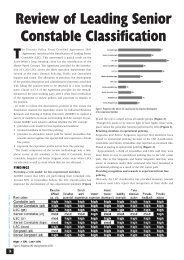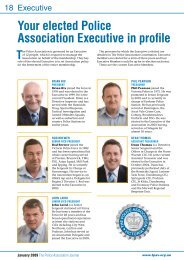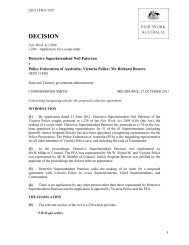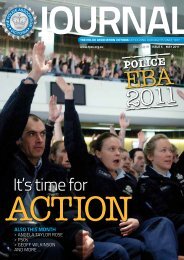August 2009 - The Police Association Victoria
August 2009 - The Police Association Victoria
August 2009 - The Police Association Victoria
Create successful ePaper yourself
Turn your PDF publications into a flip-book with our unique Google optimized e-Paper software.
20<br />
<strong>Police</strong> <strong>Association</strong> History<br />
<strong>The</strong> <strong>Police</strong> Journal<br />
A chronicle of <strong>Association</strong><br />
news & views for over 90 years<br />
This month we continue the<br />
story of our own Journal.<br />
For more than 90 years, <strong>The</strong><br />
<strong>Police</strong> <strong>Association</strong> Journal<br />
has chronicled the actions<br />
and achievements of its<br />
members for which today’s<br />
members owe so much.<br />
What we have today should<br />
not be taken for granted.<br />
Today our objectives are the<br />
same – to achieve continual<br />
improvements to police<br />
salaries and conditions.<br />
‘Sobriety is the quality most to be desired in a policeman.<br />
… being a teetotaller with or without pledge is a great protection<br />
to the man who cannot always trust himself, especially from<br />
those people who through mistaken kindness so often offer a<br />
policeman drink while on duty …’<br />
Homilies such as this were<br />
published frequently in early<br />
issues of <strong>The</strong> <strong>Police</strong> Journal,<br />
along with doggerel exhorting<br />
members to pay their dues and<br />
poems honouring the memory of<br />
fallen colleagues. Intermingled<br />
with meeting minutes and items<br />
of official correspondence, such<br />
items of general interest were an<br />
integral part of the original journal<br />
style: a format which continued<br />
relatively unchanged for decades.<br />
Printed and published initially by<br />
Wilke, Mitchell & Co., of King Street,<br />
Melbourne, the journal of sixteen<br />
pages included paid advertising,<br />
photographs and illustrations.<br />
Constable Frederick Charles<br />
Murphy, the inaugural editor of the<br />
journal, resigned from the position,<br />
and that of <strong>Association</strong> secretary,<br />
on 3 January 1919. His resignation<br />
followed a dispute with fellow<br />
members regarding an honorarium<br />
of one hundred and fifty pounds,<br />
that was paid to his wife, purportedly<br />
to compensate her for the time he<br />
spent on <strong>Association</strong> duties.<br />
Murphy did not have the use of<br />
a typewriter or clerical support to<br />
assist with the production of the<br />
first two issues of the journal, so<br />
in order to alleviate his workload<br />
the Executive appointed a ‘Journal<br />
Committee’ comprised of Murphy<br />
and District Delegates G. Byres of<br />
Russell Street and R.P. Jones of Ascot<br />
Vale. Formed initially to shoulder<br />
some of Murphy’s workload, the<br />
idea of a journal committee proved<br />
so successful that it became a<br />
permanent arrangement over<br />
succeeding decades.<br />
Following Murphy’s unexpected<br />
resignation, an acting editor filled<br />
the position for two months, until<br />
Constable William E. Adamson<br />
of Russell Street was appointed<br />
secretary and editor from 1919<br />
to 1923.<br />
Throughout this period some<br />
members of the <strong>Association</strong> argued<br />
that they would be better served if<br />
the positions of secretary and editor<br />
were filled by a person who was<br />
not a member of the Force. <strong>The</strong>ir<br />
reasoning was that a civilian would<br />
not be constrained in his actions or<br />
views by the vagaries of the police<br />
discipline system that governed<br />
serving police.<br />
<strong>The</strong> first civilian secretary and<br />
editor was former school teacher,<br />
Albert James Gill. Chosen from a<br />
strong field of 40 applicants, Gill<br />
served from <strong>August</strong> 1923 till April<br />
1929, when he was replaced by<br />
Victor Gustav Price, who transferred<br />
to the <strong>Association</strong> after working on<br />
the staff at State Parliament House<br />
for 21 years.<br />
Price was secretary and editor<br />
during the tumultuous period<br />
when Chief Commissioner Thomas<br />
Blamey destroyed the original<br />
<strong>Victoria</strong>n <strong>Police</strong> <strong>Association</strong><br />
and replaced it with a puppet<br />
organisation of his own making;<br />
subtlety renamed the <strong>Victoria</strong> <strong>Police</strong><br />
<strong>Association</strong>.<br />
<strong>The</strong> last journal edited by Price<br />
was Volume XIV, No.1, published on<br />
30 June 1931. <strong>The</strong>re then followed<br />
a hiatus of two months, when<br />
no journal was published, until<br />
September 1931, when the ‘new’<br />
<strong>Association</strong> published Vol. 1, No.<br />
1, of <strong>The</strong> <strong>Victoria</strong> <strong>Police</strong> <strong>Association</strong>.<br />
Initially distributed gratis to all<br />
members of the Force, the ‘new’<br />
journal reflected its origins. It did<br />
<strong>August</strong> <strong>2009</strong> <strong>The</strong> <strong>Police</strong> <strong>Association</strong> Journal<br />
www.tpav.org.au


